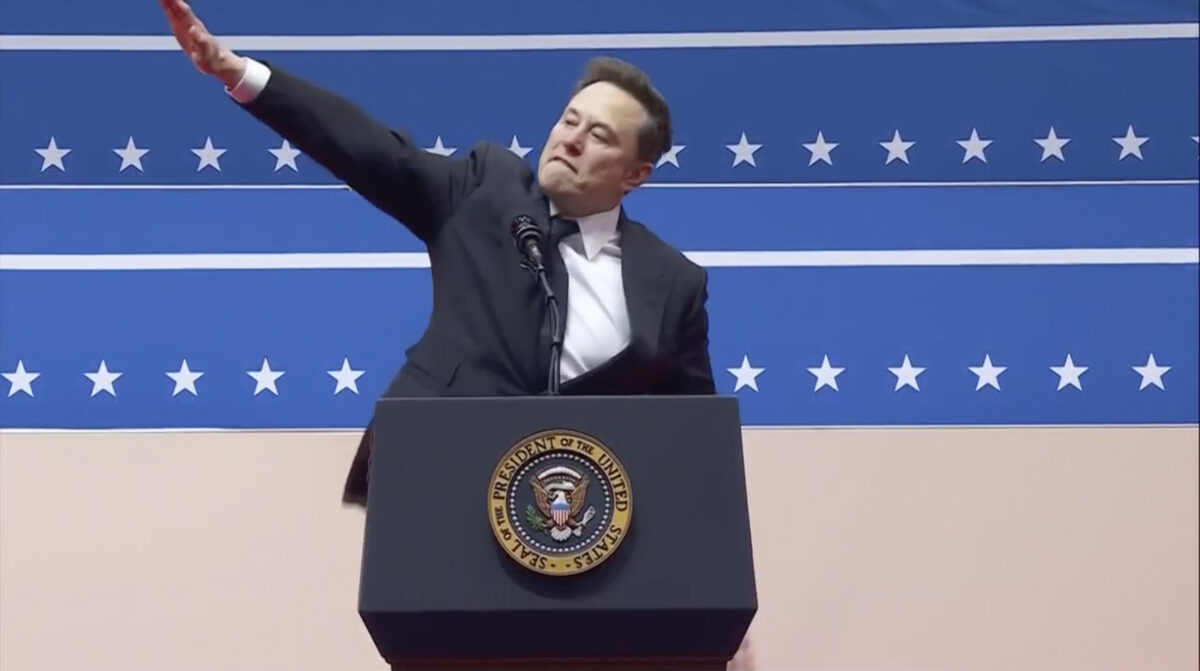Elon Musk Doesn’t Have a Valid Legal Case Against Critics Who Accused Him of Doing a Nazi Salute — But That Never Was the Point, Was It?

AP Photo.
Elon Musk has frequently used litigation — either actually filing suit or just threatening to do so — to battle his critics, and the recent controversy over his gestures at President Donald Trump’s inauguration rally is no exception. And even though his claim that it’s defamatory to say it looked like he was doing a Nazi salute won’t withstand constitutional scrutiny, that never really was the Chief Twit’s point anyway.
Musk has been loudly criticized for a salute gesture he made twice at President Donald Trump’s inauguration that, despite the efforts of his defenders to shrug it off, very closely resembled the physicality of a Nazi salute, was cheered by Nick Fuentes and other avowed neo-Nazis, and was generally acknowledged to be the sort of gesture it would be extremely unwise to attempt in Germany (where it is a crime) or at your workplace.
The billionaire’s defenses initially were to mock his critics as overeager scolds claiming “everyone is Hitler” — a framing that dangerously twisted the lessons of history — and he soon shifted to offense, clearly articulating threats to file defamation suits against anyone accusing him of making a Nazi salute.
If it looks like a duck…
In a recent appearance on CNN NewsNight, Washington Post columnist Catherine Rampell bluntly questioned why Musk “keeps getting the benefit of the doubt” when embroils himself in these controversies, pointing to his strong support of Germany’s far-right party, AfD (“Alternative für Deutschland,” or “Alternative for Germany”), and long list of past incidents where he has amplified a comment or made a comment himself many interpreted as antisemitic.
When conservative commentator Scott Jennings accused Rampell of suffering from “Elon Derangement Syndrome” and said anyone calling it a Nazi salute was being “ridiculous” and should probably “lawyer up,” Rampell fired back by challenging Jennings to “do it right now on TV” if the gesture really were harmless.
Rampell was far from the only one to make, directly or indirectly, such accusations against Musk. MSNBC’s Rachel Maddow delivered a scathing monologue on her inauguration day show, sardonically noting that the stark visual of Musk’s salutes “added a nice bloodcurdling chill to the day for many people.” In an appearance on MSNBC the following week, Minnesota Governor and former Vice Presidential candidate Tim Walz said “of course he did” regarding whether Musk gave a Nazi salute.
In the aftermath, Musk has repeatedly responded to tweets calling for him to file defamation suits against Rampell, Maddow, Walz, CNN, MSNBC and others with “Good idea” or similar sentiments. Even his mother Maye Musk weighed in with a tweet complaining she had “been receiving so much hatred” after the CNN panel was “yelling about Nazi salutes” and urging her son to “please sue them.”
How do you prove a defamation claim?
Musk might not like being accused of doing a Nazi salute, but can he actually win a lawsuit?
To prove a defamation claim (characterized as libel if the allegedly defamatory comment is in writing and slander if it is spoken), the plaintiff has to prove that the comment was presented as a statement of fact but was untrue; that it was “published,” meaning it was shared with a third party or posted publicly (this would include social media posts, newspaper articles, online posts, comments made on television or radio programs, etc.), that the defendant was at least negligent in determining the falsity of the statement; and the statement caused harm to the plaintiff.
An added hurdle for Musk is the landmark 1964 New York Times v. Sullivan case, in which the Supreme Court established an “actual malice” requirement for public figures seeking to prove defamation claims. To prevail, a public figure plaintiff must prove that the defendant made the false statement “with knowledge that it was false or with reckless disregard of whether it was false or not.” Musk cannot conceivably hope to argue that he’s not a public figure as the world’s richest man, an international celebrity, and someone with a role so prominent in the Trump administration that he’s dominating Oval Office pressers and being regularly mocked as Trump’s co-president or even “President Musk.”
Another MAGA-aligned billionaire, casino magnate Steve Wynn, recently filed a petition asking the Supreme Court to overturn Sullivan. It’s unknown if the Court will agree to hear the case, even dominated by Trump nominees, but setting aside the actual malice standard would not be enough for Musk to prevail. He cannot prove any of the required elements of defamation besides the second one — the comments in social media posts and made on television were unquestionably “published” — making his tweeted threats of litigation sound like mere digital saber rattling.
Opinions, even “odious and repugnant” ones, are protected speech
Musk’s biggest obstacle is that the “Nazi salute” comments can be categorized as opinion, and decades of First Amendment case law in this country make it very clear that it’s not defamatory to voice opinions, no matter how vicious or mean-spirited.
“The Supreme Court has been clear that expressing opinions cannot be the basis for defamation liability; only false facts can be grounds for defamation liability,” wrote eminent constitutional law scholar and dean of the UC Berkeley School of Law Erwin Chemerinsky when Mediaite reached out to him for comment on this article. “Expressing that Musk’s salute looked like a Nazi salute is an opinion.”
“And besides that, it did look like this,” Chemerinsky added. “There is no basis for defamation liability. This is just an effort to intimidate the press.”
New York Law School professor emerita Nadine Strossen also viewed the Nazi salute comments as clear opinions, and noted that it wouldn’t even help if Musk testified he didn’t personally mean to do a Nazi salute or presented evidence from other people who agreed with him.
“Even if Musk did not intend to mimic the Nazi salute, and even if reasonable people could disagree as to whether it in fact mirrored the Nazi salute, to characterize it as such is not the type of specific, objectively verifiable/falsifiable factual matter” that would be “necessary” to prove defamation, she wrote to Mediaite.
In fact, case law precedent goes further by finding that directly calling someone a “Nazi” is still mere opinion and therefore not defamatory. Last year, a federal judge in Florida ruled that a plaintiff hadn’t proved defamation or intentional infliction of emotional distress claims when a state representative repeatedly called him a Nazi in social media posts, no matter how “odious and repugnant” and “beneath the dignity of someone who holds political office” those posts might have been.
Contrast that with a defamation suit filed against Musk over a tweet he posted in 2023 falsely identifying a recent college graduate named Ben Brody as a neo-Nazi who participated in a brawl with the Proud Boys, another far-right group, and additionally claiming Brody was an undercover federal agent involved as part of a false flag operation. Brody, who is Jewish, was hundreds of miles away from the scene of the brawl but the facts were powerless against Musk’s hordes of followers, who subjected Brody to a torrent of harassment and threats. As of the date of this article’s publication, Musk’s tweet is still up and it does not have any public Community Notes correcting the false information.
Calling someone a Nazi? That’s opinion and protected free speech. Saying that a specific individual is a specific neo-Nazi who was in a specific brawl on a specific date and time at a specific place to carry out a false flag scheme for the feds? Now you’re making statements of fact and the First Amendment will not shield you.
Lastly, Musk would likely have trouble proving he was harmed by these comments. The criticism hasn’t diminished his influence in the White House, the people criticizing him over the salutes had criticized him before, and his supporters still seem to be on his side — whose opinion of Musk can be shown to have flipped from this? Moreover, the defendants would be able to argue that Musk has vociferously supported the AfD and other far-right groups around the world and not only mutated Twitter into a much more receptive platform for antisemitic content as X, he’s repeatedly posted and amplified antisemitic content himself. He’s still insanely rich and powerful (arguably even more so over the past few weeks) and when someone’s spent years posting conspiracies blaming Jews and donating to far-right parties and candidates, does it really tarnish his reputation any further if someone says he flung his right arm upwards like that genocidal Austrian who ruined Charlie Chaplin mustaches?
Losing the battle to win the war
The trouble, unfortunately, is that while Musk’s chances of proving a defamation claim from these Nazi salute comments are somewhere between a 5’8″ klutz like me being drafted by an NBA team and Taylor Swift taking Musk up on his creepalicious offer to impregnate her, he doesn’t actually have to win the lawsuit to smite his critics.
Besides the unquestionable reality that litigation, or even the threat thereof, is stressful, defending against a civil lawsuit is a seismic expense, with legal fees quickly adding up to tens of thousands if not hundreds of thousands of dollars. Large media outlets and social media companies have preferred to pay settlements to end the financial bleeding when sued by Trump, despite having the resources to fight and legal scholars scoffing at the merits of the president’s claims. If Facebook’s parent company Meta can’t stomach a prolonged court battle, how can an individual reporter be expected to do so?
“The lawsuit itself is the punishment,” Professor Strossen told Mediaite, pointing out how Trump had boasted about one flimsy claim he had filed, “I spent a couple of bucks on legal fees, and they spent a whole lot more. I did it to make his life miserable, which I’m happy about.”
And then there’s the terrifying power wielded by Trump from the Resolute Desk and Musk as he rampages through the government with his DOGE squad. The president’s attack dog at the FCC, Brendan Carr, has revived old investigations filed by aggrieved MAGA loyalists against ABC, NBC, and CBS, and launched new ones against NPR, PBS, and so on. None, meanwhile, are being pursued against the much more Trump-friendly Fox News.
The final weapon Trump and Musk can deploy is the fanatical hordes they can call to action against their opponents. The New York Times collected a comprehensive list of every insult Trump tweeted from the time he launched his first presidential campaign in June 2015 until he was kicked off Twitter at the end of his first term over his Jan. 6 tweets. Scrolling through the list is a carpal-tunnel-inducing endeavor and many of the people listed were the target of sustained harassment, death threats, and in some cases in-person confrontations. Trump’s 2020 loss and years of social media banishment did not chill his lust for vengeance, and it would be a difficult task to find one of his campaign rally speeches or Oval Office pressers where he didn’t make an insulting swipe or two or fifty-seven at his foes.
Musk deploys the same modus operandi — turned up to eleven now that he has the imprimatur of government officialdom with DOGE. His tweets making claims about waste and fraud in various federal agencies often identify a scapegoat in the form of a prominent Democrat, celebrity, non-MAGA media outlet, or Never Trump Republican. The Bulwark was one of those targets earlier this month; Musk’s false accusations that Bulwark editor-at-large Bill Kristol was getting USAID funds led to threatening tweets, including one that said Kristol “should be executed for treason.”
Wrote Bulwark publisher Sarah Longwell:
[T]his is a first for us as Americans. Never before has a presidential administration so openly wielded the power of the federal government as a blunt-force instrument to be used against fellow Americans, journalism outlets, and, yes, its political rivals. We’re in a new place now.
Their working theory seems to be that maybe they can cow their critics and the media itself into submission. Maybe they can more easily turn the government into a plaything for their own personal enrichment…
You see the playbook, yes? First they threaten you. Then they create conspiracy theories about you. Then they hound you with an online mob to make sure you fall in line.
Longwell vowed that her publication and colleagues would not yield to this “authoritarian playbook,” but that fortitude is rare. Jeff Bezos, whose wealth has occasionally catapulted him above Musk in the global billionaire rankings, still put his thumb on the scale as owner of The Washington Post to tilt it in a pro-Trump direction, blocking an op-ed endorsing then-Vice President Kamala Harris. The billionaire who has the Los Angeles Times among his collection of baubles, Patrick Soon-Shiong, has taken an even more aggressively red-pilled turn, as Oliver Darcy’s Status newsletter has covered extensively.
SLAPPing back at the litigious bullies
It’s situations like this that inspired the passage of “anti-SLAPP” laws, which help defend against a “Strategic Lawsuit Against Public Participation.” The inimitable Ken White (better known as his online alias, “Popehat”) wrote a column for The Unpopulist (disclosure: this reporter is a series editor there) in which he explained the crushing “power differential” that can arise when a plaintiff has “unlimited wealth and political power” like Trump or Musk. I encourage you to read White’s column for his deep dive into this topic, but essentially the way anti-SLAPP laws function is by allowing the defendant to hit a pause button early in the litigation, file a motion arguing that the statement the plaintiff claims is defamatory is actually “potentially protected speech,” and then the judge can order the plaintiff to “come forward with admissible evidence showing they can possibly win the case.”
White called these laws “a game-changer” because if the plaintiff loses the motion, the case is dismissed, and the plaintiff must pay the defendant’s attorney fees. The end result is these laws both stanch the financial bleeding and stress caused by litigation and impose a disincentive against plaintiffs tempted to file meritless cases for harassment purposes.
Strossen explained the broader public good of protecting against SLAPP lawsuits: “This kind of burdensome litigation not only punishes the speaker who is sued, but it also punishes all the rest of us: it deters other would-be critics from voicing their views, and it hence deprives everyone of the right to receive such views.” It should be noted that Strossen is both a past national president of the ACLU and a senior fellow with the Foundation for Individual Rights and Expression (FIRE), which have represented ideologically diverse clients and count left- and right-leaning legal experts among their ranks. This sort of bipartisan activism is not unheard of with free speech scholars; First Amendment pioneer Floyd Abrams has represented clients all over the political spectrum.
The Sullivan actual malice standard, making it harder for public figures to win defamation claims, was designed, Strossen added, “precisely to permit robust criticism of such powerful figures, which is essential for maintaining a healthy democracy,” and anti-SLAPP statutes operate in a similar fashion “seek[ing] to curb the burdensomeness of unfounded defamation lawsuits.”
Cracks in the shield
Unfortunately, the shield of anti-SLAPP laws has massive cracks in it, and litigious billionaires know exactly how to slip through them.
These laws have not been passed in all states, and there isn’t one at the federal level. Further complicating matters is the disagreement among the federal Circuit Courts about whether or not a state anti-SLAPP law applies when a state claim is argued in a federal case. Trump and Musk are experienced forum shoppers and have been known to file their lawsuits in hospitable jurisdictions to deprive their targets of anti-SLAPP defenses.
White has been very vocal arguing it is long past time to pass a federal anti-SLAPP law, but acknowledges the “grim political reality” such efforts face:
Congress has repeatedly considered federal anti-SLAPP statutes, but they’ve never passed one. In December 2024 members of Congress from both sides of the aisle proposed a new one. It has strong and diverse backing. It ought to pass on its merits. After all, both parties pay lip service to free speech and purport to oppose frivolous lawsuits, and there are plenty of nonpartisan stories of financially ruinous and frivolous litigation. This can be spun in a way that appeals to everyone.
Yet the proponents face a grim political reality. Donald Trump has a compliant Republican Congress that is sensitive to his extreme tenderness to offense. Even if backers don’t spin the bill as a rebuke to Trump’s habit of bad-faith litigation, Republicans may perceive the bill as such. Trump himself has a long history of wanting to make it easier, not harder, to sue for defamation, repeatedly saying that he wants to “open up” libel laws to allow aggrieved plaintiffs to “sue them and win money.” The bill’s sponsors need to find a way to frame this fight so that it flatters his ego, or he’ll veto it out of pique.
In the meantime, anyone who dares criticize the Cybertruckmonger for the way he flings his right arm or writes his tweets risks being targeted by a wave of abusive, garbage litigation that he can afford to underwrite indefinitely. No matter how baseless the claims, Musk will likely be able to find a lawyer to file these lawsuits whenever he’s willing to keep writing the checks, and the lawyers can conduct their legal reigns of terror as long as they stop short of the line of actually exhibiting dishonesty to the court and other ethical violations that have gotten so many Trump attorneys disbarred.
There is still strength in numbers. Both Trump and Musk have shown they can be swayed by public opinion, to the point of being oversensitive to polls. Former Republican members of Congress like Adam Kinzinger and Liz Cheney are out of office but not out of the spotlight. There are publications, writers, activists, and legal scholars who are refusing to sit down and shut up.
To paraphrase the saying apocryphally attributed to Edmund Burke, the only thing necessary for evil to triumph is for good men and women to do nothing — and there are millions of Americans who are not wired to stay silent and comply as constitutional rights are under attack.
This column has been updated with additional information.
This is an opinion piece. The views expressed in this article are those of just the author.




